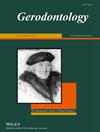Indonesian dentists' views on providing oral health care for older adults
IF 2
3区 医学
Q2 DENTISTRY, ORAL SURGERY & MEDICINE
引用次数: 0
Abstract
BackgroundWith demographic changes in aging populations, dentists require special care protocols to treat older adults with diverse and complex oral health needs and problems. Knowledge, positive attitudes, and sufficient practice experience are essential components for promptly treating older adults. However, many dentists encounter multiple barriers influencing their willingness to provide care for older adults. This study assessed Indonesian dentists' knowledge, attitudes, and practices (KAP) in providing oral health care (OHC) for older adults, including their willingness and barriers.MethodsA cross‐sectional survey was conducted with 392 dentists employing an online questionnaire between April and June 2022. The respondents' KAP was categorised utilising a modified Blooms' cut‐off point of ≥60%. Data were analysed using descriptive statistics, the印度尼西亚牙医对为老年人提供口腔保健服务的看法
背景随着人口老龄化的变化,牙科医生需要特殊的护理方案来治疗有各种复杂口腔健康需求和问题的老年人。知识、积极的态度和足够的实践经验是及时治疗老年人的基本要素。然而,许多牙医在为老年人提供医疗服务时会遇到多种障碍。本研究评估了印尼牙医在为老年人提供口腔保健(OHC)方面的知识、态度和实践(KAP),包括他们的意愿和障碍。方法:2022 年 4 月至 6 月期间,我们采用在线问卷对 392 名牙医进行了横断面调查。受访者的 KAP 采用修正的布卢姆斯截断点进行分类,即≥60%。结果大多数牙医对为老年人提供口腔保健服务有足够的认识(62.2%)、积极的态度(95.4%)、足够的实践经验(91.6%)和高度的意愿(98%)。然而,91.4%的人遇到的障碍主要与人际沟通、疾病的复杂性和多药治疗以及患者的功能状况有关。结论在老年牙科方面实施持续专业发展(CPD),将老年牙科纳入本科课程,以及提高老年人就诊的便利性,可以改善牙医的准备情况,有利于将来在印度尼西亚为老年人提供口腔保健服务。
本文章由计算机程序翻译,如有差异,请以英文原文为准。
求助全文
约1分钟内获得全文
求助全文
来源期刊

Gerodontology
医学-老年医学
CiteScore
4.10
自引率
10.00%
发文量
50
审稿时长
3-6 weeks
期刊介绍:
The ultimate aim of Gerodontology is to improve the quality of life and oral health of older people. The boundaries of most conventional dental specialties must be repeatedly crossed to provide optimal dental care for older people. In addition, management of other health problems impacts on dental care and clinicians need knowledge in these numerous overlapping areas. Bringing together these diverse topics within one journal serves clinicians who are seeking to read and to publish papers across a broad spectrum of specialties. This journal provides the juxtaposition of papers from traditional specialties but which share this patient-centred interest, providing a synergy that serves progress in the subject of gerodontology.
 求助内容:
求助内容: 应助结果提醒方式:
应助结果提醒方式:


